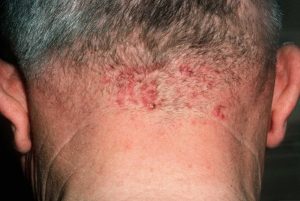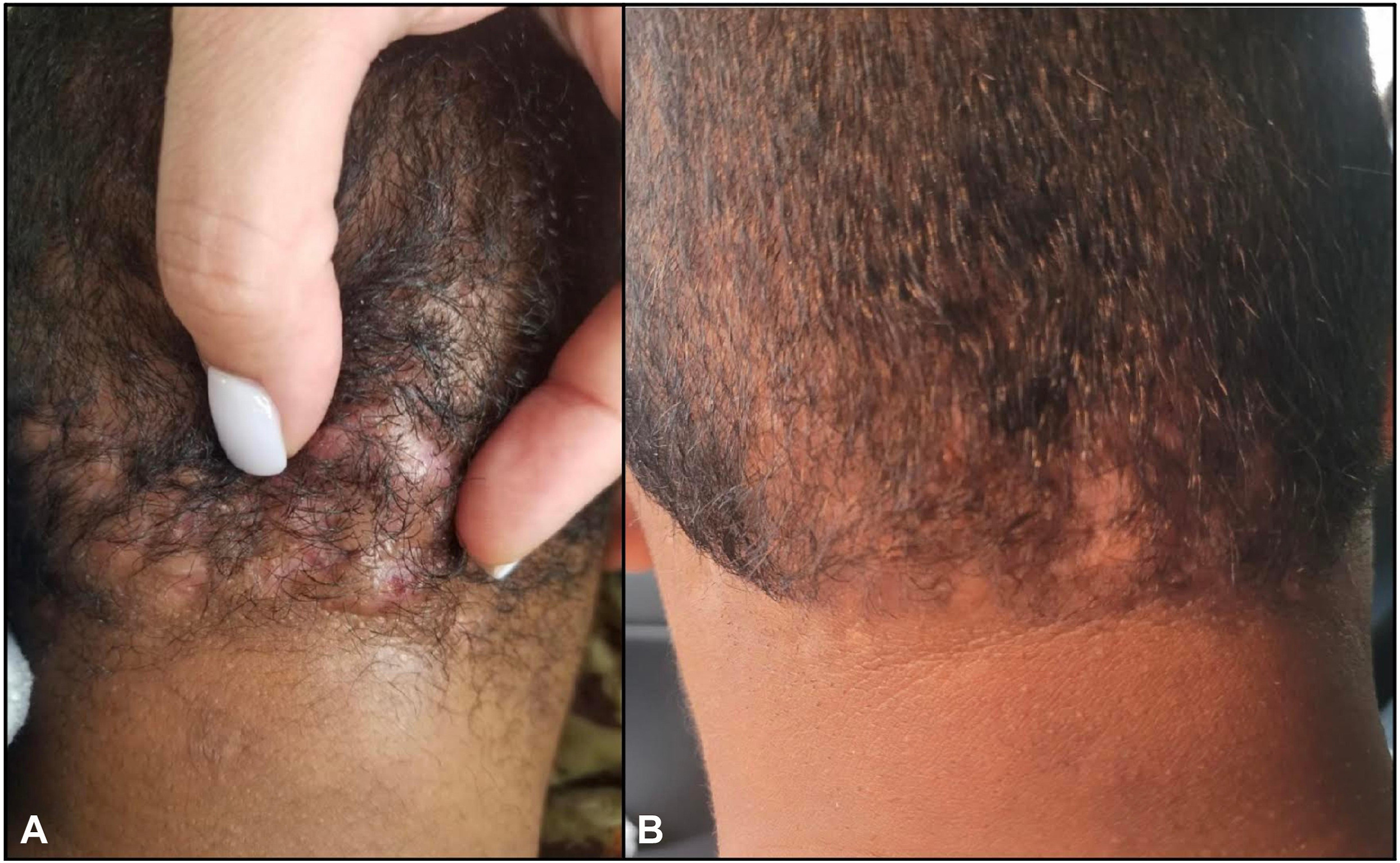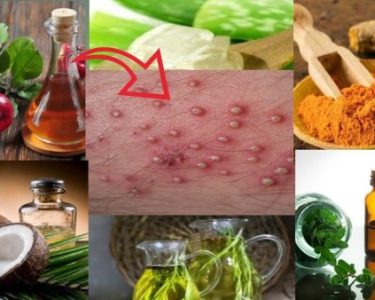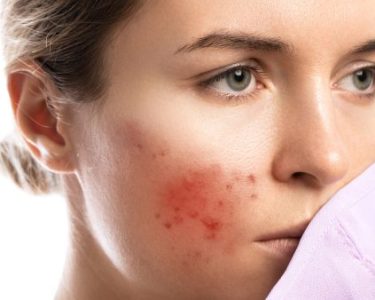Folliculitis Keloidalis Nuchae (FKN) is a chronic skin condition that affects the hair follicles, primarily on the back of the neck. It commonly occurs in men with curly hair but can affect individuals of any hair type. Understanding its causes, symptoms, and treatment options is essential for managing the condition effectively.
What Is Folliculitis Keloidalis Nuchae?
Folliculitis Keloidalis Nuchae is a chronic inflammatory skin disorder characterized by the formation of itchy, painful bumps that can lead to keloid-like scars. It usually develops where hair follicles are subjected to friction or irritation, especially around the neck’s hairline.
Related Articles: 10 Natural Remedies for Folliculitis
Causes of Folliculitis Keloidalis Nuchae
The exact cause of FKN remains unclear, but contributing factors include:
- Hair Texture: Curly or coarse hair is more prone to ingrown hairs.
- Hair Removal: Shaving or trimming hair closely can irritate hair follicles.
- Friction: Tight collars, helmets, or shirt collars can worsen the condition.
- Genetics: A family history of keloid formation increases the risk.

Symptoms of Folliculitis Keloidalis Nuchae
Understanding the symptoms of Folliculitis Keloidalis Nuchae can help with early detection and management of the condition.
Related Articles: 12 Natural Home Remedies for Folliculitis Treatment
- Small, Itchy Bumps
The earliest sign of FKN is the appearance of small, red or flesh-colored bumps at the back of the neck or along the hairline. These bumps are often itchy and may cause mild discomfort. - Pustules (Bumps with Pus)
As the condition progresses, the bumps can become filled with pus, forming pustules. These may rupture, causing crusting and potential infection. - Pain and Tenderness
Infected or inflamed lesions may be painful, particularly when touched or irritated by clothing or hair clippers. - Keloid-like Scars
One of the distinguishing features of FKN is the development of keloid-like scars. Over time, the small bumps may merge, forming raised, thickened scars that can be dark or reddish-brown. - Hair Loss (Alopecia)
FKN can lead to permanent hair loss in the affected areas due to follicle damage and scarring. This results in patches of bald skin at the back of the neck. - Skin Discoloration (Hyperpigmentation)
The affected skin may become darker (hyperpigmented) due to chronic inflammation and scarring, leading to noticeable changes in skin tone. - Hard Nodules
In severe cases, hard nodules may form, causing significant cosmetic concerns and discomfort. These nodules are usually resistant to treatment and may require surgical removal.
Related Articles: Top Natural Remedies for Battling Bacterial Folliculitis : From Tea Tree Oil to Turmeric
Treatment Options for Folliculitis Keloidalis Nuchae
Folliculitis keloidalis nuchae (FKN) is a chronic skin condition characterized by inflamed hair follicles, leading to keloid-like scars on the back of the neck and scalp. It commonly affects men of African, Hispanic, and Asian descent but can occur in anyone. Managing FKN involves a combination of medical treatments, lifestyle adjustments, and, in severe cases, surgical intervention. Effective treatment options for folliculitis keloidalis nuchae.
1. Topical Treatments
- Corticosteroids
- Usage: Applied directly to reduce inflammation and swelling.
- Examples: Hydrocortisone, clobetasol propionate.
- Antibiotic Creams and Gels
- Usage: Help combat bacterial infections.
- Examples: Clindamycin, mupirocin.
- Retinoids
- Usage: Promote skin turnover and reduce follicular plugging.
- Examples: Tretinoin, adapalene.
2. Oral Medications
- Antibiotics
- Purpose: Treat active infections and prevent recurrence.
- Examples: Doxycycline, erythromycin.
- Oral Corticosteroids
- Usage: Prescribed in severe cases to reduce inflammation.
- Isotretinoin
- Purpose: Used for resistant cases to reduce oil production and inflammation.
3. Injectable Treatments
- Intralesional Corticosteroids
- Usage: Injected directly into lesions to reduce inflammation and flatten raised scars.
Related Articles: Natural Solutions to Treat Folliculitis Bumps on the Scalp
4. Physical and Surgical Interventions
- Laser Therapy
- Usage: Hair removal lasers can reduce hair growth, preventing further follicle blockage.
- Surgical Excision
- Purpose: Removes large, resistant keloids or infected tissue.
- Cryotherapy
- Usage: Freezing keloids can help reduce size and inflammation.
5. Lifestyle Modifications
- Hair Care Practices
- Avoid close shaving or using harsh chemicals.
- Use electric clippers with guards for trimming.
- Hygiene and Skincare
- Regularly cleanse the affected area with antibacterial soaps.
- Use non-comedogenic moisturizers to reduce skin irritation.
6. Herbal Treatment for Folliculitis
Many people turn to natural remedies for relief from FKN. Here are some Herbal Treatment for Folliculitis to consider:
- Aloe Vera: Its soothing and anti-inflammatory properties can reduce redness and itching.
- Tea Tree Oil: Known for its antibacterial effects, it may help combat infection.
- Witch Hazel: Helps reduce irritation and inflammation.
- Turmeric: Its anti-inflammatory and antimicrobial qualities can support healing.
Tip: Always perform a patch test before using herbal treatments to avoid allergic reactions.
Related Articles: Folliculitis After Waxing: How to Prevent and Treat This Annoying Problem
Prevention Tips
- Avoid Close Shaving: Use an electric trimmer instead of a razor.
- Wear Loose-Fitting Clothing: Prevent irritation from collars and helmets.
- Maintain Good Hygiene: Wash the neck area regularly with a gentle cleanser.
- Moisturize the Skin: Use non-comedogenic moisturizers to keep the skin hydrated.
Final Thoughts
Folliculitis Keloidalis Nuchae can be challenging to manage, but with proper treatment and preventive measures, its impact can be minimized. If you experience persistent or worsening symptoms, consult a dermatologist for a tailored treatment plan. Incorporating both medical and herbal treatment for folliculitis may offer effective relief and improve skin health.




